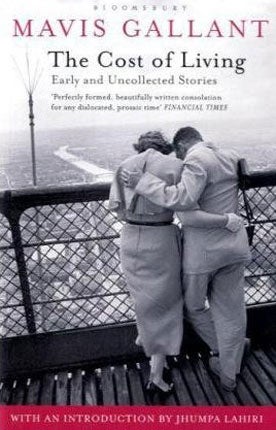The Cost of Living: Early and Uncollected Stories, by Mavis Gallant

Your support helps us to tell the story
From reproductive rights to climate change to Big Tech, The Independent is on the ground when the story is developing. Whether it's investigating the financials of Elon Musk's pro-Trump PAC or producing our latest documentary, 'The A Word', which shines a light on the American women fighting for reproductive rights, we know how important it is to parse out the facts from the messaging.
At such a critical moment in US history, we need reporters on the ground. Your donation allows us to keep sending journalists to speak to both sides of the story.
The Independent is trusted by Americans across the entire political spectrum. And unlike many other quality news outlets, we choose not to lock Americans out of our reporting and analysis with paywalls. We believe quality journalism should be available to everyone, paid for by those who can afford it.
Your support makes all the difference.It has been a good year for short fiction in paperback, with the publication of John Updike's moving valedictory offering My Father's Tears and Other Stories, as well as the emergence of new talent in the form of Daniyal Mueenuddin's wonderful collection In Other Rooms, Other Wonders. But The Cost of Living stood out.
It brings together stories from the first 20 years of Mavis Gallant's career (1951-1970), many of them previously uncollected. They are, without exception, superb; strikingly modern tales of exile and cultural dislocation, informed by Gallant's experiences as a Canadian expat in post-war Europe.
Like Chekhov, she has the ability to suggest an entire world with a few, sure brushstrokes: she evokes the Parisian student milieu ("One Aspect of a Rainy Day"); the bohemia of the Left Bank ("The Cost of Living"); and the workings of a movie set ("Willi") with a remarkable lightness of touch.
A leitmotif is the difficulty involved in forming and sustaining human contact. Gallant depicts failures of communication with exquisite subtlety: characters talk but rarely listen; conversations become "double monologues". When the narrator of the title story describes the breakdown of her friendship with a friend ("water rushed between us and we stood on opposite shores"), she encapsulates Gallant's vision of human separateness.
But the masterful final story, "The Burgundy Weekend", offers a glimmer of consolation. It follows a Canadian couple on a tour of France – Lucie, a kind-hearted nurse, and her ineffectual husband Jerome – and touchingly sketches the contours of their relationship. Though it is far from the perfect marriage, the protagonists learn to accept their lot: "Every marriage is different. Ours is like this," Lucie says. Together they find, if not happiness, then a kind of peace.
Join our commenting forum
Join thought-provoking conversations, follow other Independent readers and see their replies
Comments